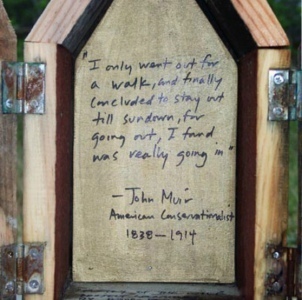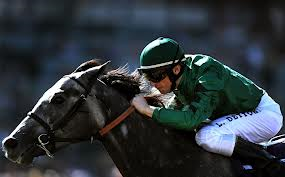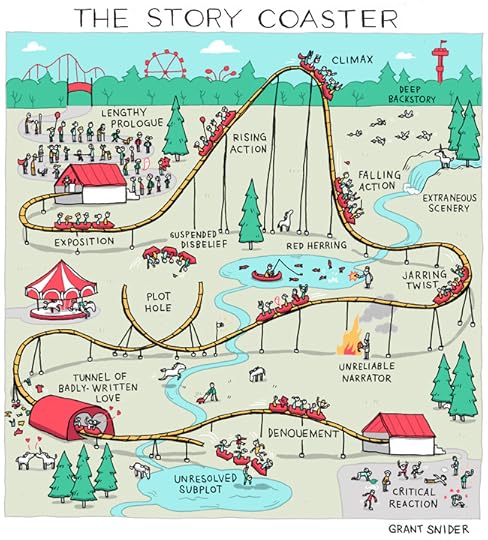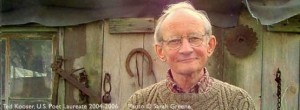Susan Gabriel's Blog, page 22
September 22, 2013
Lucille Clifton’s Fury!
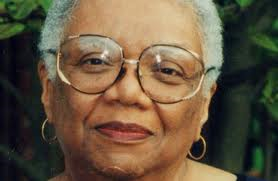 According to Writer’s Almanac, Lucille Clifton’s family descended from slaves; her father was a steelworker and her mother worked in a laundry. Her mother, though uneducated, was also a poet. She was once offered the chance to publish her poems, but her husband refused to let her. Clifton wrote about this in her poem “fury.”
According to Writer’s Almanac, Lucille Clifton’s family descended from slaves; her father was a steelworker and her mother worked in a laundry. Her mother, though uneducated, was also a poet. She was once offered the chance to publish her poems, but her husband refused to let her. Clifton wrote about this in her poem “fury.”
for mama
remember this.
she is standing by
the furnace.
the coals
glisten like rubies.
her hand is crying.
her hand is clutching
a sheaf of papers.
poems.
she gives them up.
they burn
jewels into jewels.
her eyes are animals.
each hank of her hair
is a serpent’s obedient
wife.
she will never recover.
remember. there is nothing
you will not bear
for this woman’s sake.
———
WE ALL, in one way or another–literally or metaphorically–ignore or fail to protect our creative lives. We are all “obedient” wives to something: the fear of what people will think, the compulsion to take care of everyone else before we take care of ourselves. Or perhaps we are “obedient” to an old way of life or an old way of thinking. What we don’t realize is the huge price it costs us.
WE MUST–women and men alike–claim and protect whatever creative talents we have, or we run the risk of not recovering.
Thoughts? Comments? As always, I love hearing from you.
September 3, 2013
My Most Popular Blog Post In the Last 5 Years
The most popular post on this blog since I started it in 2008 was not about writing or reading books. It didn’t involve an inspiring quote or a collection of amazing photographs. It was about our furry friends, our companions of the four-legged variety. Does this surprise you?
The original post appeared on April 3rd, 2012, so some of you may remember it. It was called Dogs vs. Cats–A Diary. (You can read it here.) This single post has received a HUGE number of hits over the last 17 months and proves yet again how much we love our animals. Perhaps we love them even more than we love our books.
I’m not sure what I’d do without my 2 dogs and 2 cats. Life would certainly be less enjoyable. And like these diaries show, our canine and feline friends are very different.
The first pet that I loved with my whole heart was a dog named Brecken. He was a Springer Spaniel and a bit goofy, but oh, I loved that boy. Back when I was a psychotherapist, he sat in on most of my sessions. He was one of the first therapy dogs. Though he died years ago, I’ll never forget him.
What about you? Do you have a pet that you’ll never forget?
————–
UPDATE: I am happy to announce that both of my novels, Seeking Sara Summers and The Secret Sense of Wildflower are now available as AUDIO books on Audible, Amazon and iTunes! READ by the author (that would be me).
August 27, 2013
Poetry of the Wild
Since I am a fan of wildness, as well as poetry (well, some of it anyway), I was intrigued by this creative project. I ran across it on the Poets and Writer’s blog . See what you think.
For ten years ecological artist and sculptor Ana Flores has been bringing “Poetry of the Wild”—a project that combines poetry, visual art, and nature in an effort to connect people to the land around them—to locations both public and wild. Each installation features a box or sculpture, built by artists and community members using recycled materials, that contains an original or classic poem as well as a journal for passersby to contribute reflections of their own.
Here are 4 of the 11 photos on the blog:
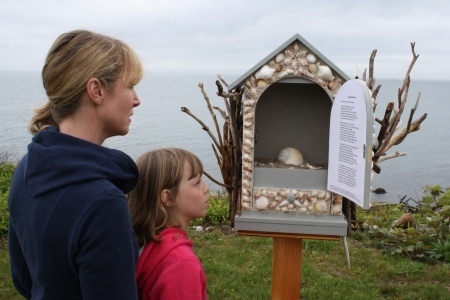
Credit – Ana Flores
A Human Error
Lucy Turner, age ten—who contributed an original poem to this year’s Poetry of the Wild installation in Mystic, Connecticut—and her mother, Pam, study a poetry box during this summer’s waterfront installation at the University of Connecticut on Avery Point. Box by artist Susan Schultz; poem, “A Human Error,” by Nancy Willard.
———————
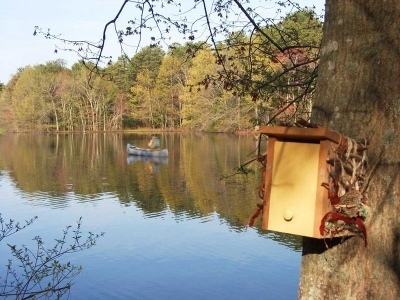
Credit – Ana Flores
On Meadowbrook Pond
A poetry box by Marnie LaCouture, housing the poem “Roads” by Ruth Bigood, mounted to a tree along the shore of Meadowbrook Pond in Richmond, Rhode Island.
————————
The House
Lily Kane, age nine, prepares to recite her poem “The House,” featured inside a box at Haley Farm Reserve in Groton, Connecticut, part of this summer’s Mystic Arts Center installation. Box by Syma Ebbin and Michael Kane.
—————–
Credit – Ana Flores
Till Sundown
A poetry box built by Ana Flores, featuring a quote by author and environmentalist John Muir, located on the Napatree Point peninsula in Westerly, Rhode Island.
——————
I want to create one of these in my backyard! (Well, I actually don’t have a yard, just a forest.) I love that children were involved in this project and I also love the John Muir quote.
What about you? Thoughts? Comments? As always, I love hearing from you.

August 20, 2013
Gambling, Wine & Mahler: A Typical Day for a Writer?
Charles Bukowski has published more than 15 wildly popular books of fiction and poetry, including Run With the Hunted (1962), and The Days Run Away Like Wild Horses Over the Hills (1969).
Late in his life he said:
“Every day I’ll wake up around noon. Then I’ll go to the track and I’ll play the horses … Then I’ll come back and I’ll swim and … have dinner and I’ll go upstairs and I’ll sit at the computer and I’ll crack me a bottle [of wine] and I’ll listen to some Mahler or Sibelius and I’ll write, with this rhythm, like always.”
Needless to say, every writer’s process is different. My day doesn’t look anything like Charles Bukowski’s day. For instance I wake up early, and then I take a walk by the river. I am back home to write by about 9 and write until around 12:30. After lunch I do the business of writing–submissions, marketing, typing changes into the computer–and then I fix dinner. I edit other people’s manuscripts in the evenings or during the day if I have a deadline. (Here is my editing/consulting website for anyone who is interested.)
I don’t play the horses or Mahler and if I cracked open a bottle of wine, I would probably fall asleep. My rhythm is a little different, but that doesn’t make it right or wrong, nor is Charles Bukowski’s, although it seems to have worked for him. We all do what we have to do to get the job done and no schedule is set in stone. (Forgive the clichés.) Sometimes I do things differently just to shake things up and sometimes deadlines blur the lines.
What about you? Do you have a set writing routine or a time when you feel most creative? What does your typical day look like?

August 13, 2013
Writer Spends Year Walking by River
Have you ever done something that surprised yourself, in a good way? I recently finished something that I never thought I could actually do, and I have to admit I’m kind of proud of myself. If you’re in the mood for a quick story, I’d love to tell you about it.
A year ago, as I sat by a beautiful river near my home, I had what Wildflower in my latest novel would call “the secret sense,” that if I didn’t make some kind of grand gesture in terms of becoming more physically active (writing is very sedentary, after all), I was going to make it harder on myself down the road and perhaps even shorten my writing career. Since I have many more books I hope to write, I began to walk that same day.
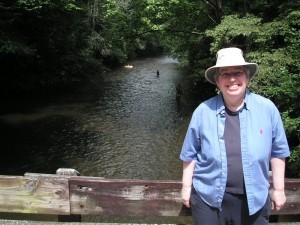 The Davidson River is a picturesque river in Pisgah National Forest located in the mountains of Western North Carolina. My goal was to try to walk 365 consecutive days and experience four complete seasons of the river and surrounding forest. I made this ambitious goal about creating a relationship with this river, because I knew if I made it about losing weight or an exercise program that I would fail, as I had many times before.
The Davidson River is a picturesque river in Pisgah National Forest located in the mountains of Western North Carolina. My goal was to try to walk 365 consecutive days and experience four complete seasons of the river and surrounding forest. I made this ambitious goal about creating a relationship with this river, because I knew if I made it about losing weight or an exercise program that I would fail, as I had many times before.
Davidson River is an old friend to me. Like many people who end up settling in this area, my daughters and I used to camp by the river when they were girls and we lived in Charleston. It was where I took them for a vacation as a single mom. The campground felt safe and met our needs. That was 25 years ago.
When we moved from Charleston to Asheville in 1994, we visited even more often, walking the same trail. As the years passed, I also took anyone I cared about to Davidson River, as if introducing them to my family. It felt more like “home” to me than any place I’d ever been. (I grew up on the other side of the Smoky Mountains in Knoxville, Tennessee.) Through the late 90s and early 2000s, my dog, Grace, and I walked along this river, sometimes with friends, sometimes alone. After she died, I released her ashes where she loved to swim.
When I started my daily walks back on August 12th, 2012, I’d had years of chronic back pain and could only hobble down the trail for about 20 minutes. I had tried everything for my aching back, except surgery, but I kept hobbling, day after day. It took months and months of walking, gradually increasing my distance, but now I am up to an hour a day and I am pain free. I never thought that was even possible.
As I write this, today is day 365. I did it! To mark the occasion, friends and family gathered for a celebratory picnic by the same river.
It hasn’t been easy. The weather was a constant factor, and I thought about quitting many times. We had record-setting rains in July and one of the rainiest years, in general, in decades. Needless to say, I have been making peace with mud puddles. At the same time, I have marveled at the beauty and resilience of this lush forest and the creatures that live here.
Friends have asked me if I’ll continue walking now that the year is up and I always say yes. I plan to keep going, although I will probably stay home on the really bad weather days in the year to come. And even on those rare days when I may choose to stay home, I imagine the river awaiting my return.
I’ve written several novels, and I have thought of more than one new story I’d like to write as a result of my time spent walking by the river. It is a very fertile place for ideas.
I have also kept a river journal, where I have documented every day with observations and my progress. I may turn that into a book someday, too. If I do, you’ll be the first to know.
So what began as a hope for future fitness evolved into an accidental pilgrimage. A time that proved to be incredibly challenging, as well as rich and full of creativity. At the end of my life, I imagine I will look back on this moment not only with gratitude, but with a sense of satisfaction for the year I dedicated to walking along a river.
So while I continue to be a writer, I am not a sedentary one. A river runs through my life now. With that in mind, I encourage you to consider beginning a pilgrimage of your own, whatever that may look like.
————
susangabriel.com
Author of The Secret Sense of Wildflower and Seeking Sara Summers
Print, ebook and audio book versions available.

July 30, 2013
A Good Rejection?
 Writing is not for the faint of heart. Nearly every step of the way involves rejection, especially if you put your work out there and want to be read. Rejections come from agents, publishers, and sometimes even readers.
Writing is not for the faint of heart. Nearly every step of the way involves rejection, especially if you put your work out there and want to be read. Rejections come from agents, publishers, and sometimes even readers.
Here are two examples from my files of what they call in the biz a “good” rejection. How the words ‘good’ and ‘rejection’ can be used together in one sentence is questionable. But while all rejections are hard, these are also heartening. See if you agree with me.
Dear Susan,
Thank you so much for sending me [xyz] but sadly I must turn down the opportunity of representing your novel. I found much to admire in these pages, and it’s clear you are a talented writer but I’m afraid I simply did not connect fully enough with this material to feel I could champion your work effectively.
I wish I wasn’t sending such a disappointing response and I hope you find a terrific agent soon. This is an impressive manuscript so I have no doubt you will find the perfect advocate – good luck and very best wishes. With regrets….[super agent to the stars]
—————————-
Here’s one for a different manuscript:
Dear Susan,
Apologies for taking so long to get to [qrs] I read the manuscript when you first sent it, then put it away to read again later, as I wanted to think about it before looking at it again. I read it again this weekend and although there are so many things I love about it, I’ve come to the difficult decision to pass on it. What I love about the book is the smart, funny voice of the narrator. It would not be overstating it to say that she is reminiscent of Harper Lee’s Scout. And the two lead characters are beautifully crafted. I feel like I know them quite well.
(But:……. I’ll spare you the details since you don’t know the story and it won’t make any sense to you, but it wasn’t anything big or horrible. Then she kept going. Very sweet of her, actually.)
It’s because I like your writing so much that I’m trying to explain this. I hope it makes sense. I’d love to read more of your work.
Thanks for letting me take a look at this. I’m sorry that in the end it wasn’t right for me. I think you’re hugely talented.
…..Executive Editor, [Random House imprint]
————-
I have to admit I like the part about being “hugely talented,” and any time you get compared to Harper Lee it’s time to throw a party! So that’s the heartening part. However, the longer I do this (15+ years and counting) the more I realize that writing takes courage and perseverance, as well as a belief in yourself and your work. Rejections are hard, no matter how good those rejection letters get.
Are you good at taking rejection? Thoughts? Questions? As always, I’d love to hear from you.
————-
Update: The Secret Sense of Wildflower AUDIO book is now available on Audible, Amazon and iTunes!

July 22, 2013
The Story Coaster Cartoon
All of us have picked up a novel to read where for one reason of another we just couldn’t finish it. Grant Snider, an illustrator and cartoonist, has created this wonderful cartoon about the things that can go WRONG in a story.
(This cartoon was originally published on July 12, 2013 in the The New York Times.)
A lengthy prologue can stop me from reading. Also, critical reaction. If a book has too many bad reviews on Amazon or Goodreads, I will usually steer clear. What about you? What will stop you from reading a novel?
(If for some reason the illustration doesn’t show up, you can go to Grant Snider’s blog to see it.)
—————-
P.S. If you’d like to hear from me more often, consider joining me on my facebook author page. I post my favorite photos, quotes and anything else I think my friends and readers might enjoy.
P.P.S. Some email subscribers didn’t receive last weeks blog post which was a Giveaway and Interview. Feedburner was being persnickety. You can click here to see that post.

July 16, 2013
***GIVEAWAY*** and Interview
A HUGE thank you to Deb at The Reading Frenzy for hosting an author interview and a book giveaway of Wildflower. She asked some great questions on the interview. Some I hadn’t been asked before, so you might even learn something new about me. Let me know what you think!
***GIVEAWAY*** Interview with Susan Gabriel who talks about her new novel The Secret Sense of Wildflower which received a starred review from Kirkus––”The Secret Sense of Wildflower started with a voice, eleven years ago, at four in the morning, a voice that woke me up from a deep sleep. It was the voice of a girl who began to tell me her story: “There are two things I’m afraid of,” she said. “One is dying young. The other is Johnny Monroe.” ”
    <img src=”http://wms-na.amazon-adsystem.com/200...″ alt=”" />
THE TWO GIVEAWAYS ARE SPONSORED BY THE AUTHOR GIVEAWAY ONE IS FOR A SIGNED PAPERBACK COPY OF THE NOVEL – US RESIDENTS ONLY GIVEAWAY TWO IS GLOBAL AND IS FOR ONE EBOOK COPY ALSO IF YOU SIGN UP FOR SUSAN’S MAILING LIST ON HER WEBSITE HERE YOU WILL BE ENTERED INTO HER CONTEST FOR BOTH HER BOOKS GOOD LUCK AND THANK YOU SUSAN
Interview with Susan Gabriel
Overview
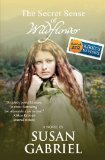 Set in 1940s Appalachia, The Secret Sense of Wildflower tells the story of Louisa May “Wildflower” McAllister whose life has been shaped around the recent death of her beloved father in a sawmill accident. While her mother hardens in her grief, Wildflower and her three sisters must cope with their loss themselves, as well as with the demands of daily survival.
Set in 1940s Appalachia, The Secret Sense of Wildflower tells the story of Louisa May “Wildflower” McAllister whose life has been shaped around the recent death of her beloved father in a sawmill accident. While her mother hardens in her grief, Wildflower and her three sisters must cope with their loss themselves, as well as with the demands of daily survival.
Kirkus Reviews
“…astute observations and wonderfully turned phrases, with nary a cliché to be found. She could be an adolescent Scout Finch…A quietly powerful story, at times harrowing but ultimately a joy to read.” – Kirkus Reviews (starred review)– And voted one of the BEST BOOKS of 2012.
––––––––––––––––––––––––––––––––––––––––––
Hi Susan, Welcome to The Reading Frenzy.
Hi Deb, it’s a pleasure to be here.
Tell us a little about your latest novel The Secret Sense of Wildflower.
The Secret Sense of Wildflower is southern, it’s historical and it’s a coming-of-age story. The main character is thirteen-year old Louisa May “Wildflower” McAllister who is feisty and smart and has a resilience that is forged with humor, a love of the land, and an endless supply of questions to God, who she’s not so sure she believes in anymore. When Johnny Monroe, the villain of the story and the town’s teenage ne’er-do-well, sets his sights on Wildflower, she must draw on the strength of her relations, both living and dead, to deal with his threat.
Where did the idea for the novel come from?
The Secret Sense of Wildflower started with a voice, eleven years ago, at four in the morning, a voice that woke me up from a deep sleep. It was the voice of a girl who began to tell me her story: “There are two things I’m afraid of,” she said. “One is dying young. The other is Johnny Monroe.” A day or two before, I had visited the small cemetery located in the southern Appalachian Mountains where many of my family are buried. I spent an afternoon walking among the final resting places of my grandparents, aunts, uncles and cousins, as well as ancestors I had never known. It felt like I had accidentally brought one of them home with me, who needed her story told.
For a fiction writer, to get the voice of a character so clearly is really good news. I, however, wanted to go back to sleep. Who wouldn’t, at 4 o’clock in the morning? For a time, I debated whether or not to get up. I ultimately decided that if I didn’t seize this moment, the voice might find someone else to write her story.
Needless to say, I turned on the light, picked up a pen and a pad of paper and began to write the story of Louisa May “Wildflower” McAllister. It took months of listening to her and seeing the scenes of her life play out in my imagination. Then it took years of revising and revisiting the story to polish it and get it ready.
According to your bio you’ve had a very eclectic career background. How has this benefited your work as a novelist?
To be honest, it never occurred to me that I might be a novelist until I was in my late thirties. Like most people, I hadn’t a clue what I really wanted to do. I suppose it was in the back of my mind somewhere that I might want to write a book someday, but life just didn’t allow the time for it. I was a single mom from the time my daughters were ages 1 and 3 and when you’re trying to be a good mom, there isn’t a whole lot of energy for creative pursuits like writing. However, I did play flute professionally for a while, but to make ends meet, so to speak, I needed to do something a little more reliable and got a degree in education and taught at-risk kids in the elementary schools. Then I attended school at night to get my counseling degree. I became a licensed professional counselor and then a marriage and family therapist for a decade, where I like to say I studied “characters” in depth.
It was in my counseling office that I had this kind of early midlife moment where I realized that I could die being a beloved therapist in the community, but I would never have done what it was that I felt I needed to do, which was to write. If I didn’t do it, I knew I would die with regrets. I changed my life after that, simplified, moved to the mountains and began to write.
Susan on the homepage of your website you have a subheading that says “Novels of courage & transformation.” Why is this important to you to emphasize?
One of the things I learned from my clients is how incredibly resilient people are. They would come to me with these horrendous stories of things that had happened to them and yet they had the courage to tell me about it and then try to make changes in their lives to make them better. That’s heroic in my view.
It was only recently that I realized that of the 8 novels I’ve written—2 are published, 1 is represented by a literary agent who specializes in children’s books, and the others are either being submitted to other agents, publishers or in various stages of rewrites—they all have courageous main characters who, in one way or another, are able to transform the tough situations they find themselves in. In a way, it’s a nod to my former clients. In other ways, it’s just what interests me.
I’ve found that Southern authors have very distinctive “Southern Fried” voices in their work. Does yours? Why do you think this is so?
Well, I grew up in the southeast and except for a few years that I lived in Colorado, I’ve lived here my entire life. For years, I swore that I would NEVER write southern fiction. I had too many “characters” in my gene pool, but as they say: NEVER SAY NEVER. It turns out I’m kind of good at it. At least Kirkus Reviews thought so, as you mentioned above, and gave The Secret Sense of Wildflower a starred review (for “books of exceptional merit”) and it was voted a Best Book of 2012. It still shocks me to have received that honor, but I am trying to claim it as well deserved

Although it’s a great honor to be in the southern genre with Harper Lee, who I’ve been compared to, and Faulkner, Eudora Welty, Flannery O’Connor, Reynolds Price (et al) and currently Ron Rash (who lives just over the next mountain ridge from where I live in the mountains of North Carolina), I’ve never really thought of myself as a southern writer. My job as I see it is to write stories and sometimes those stories have southern characters and sometimes they don’t. However, I seem to be writing about the south more and more. Perhaps I’ve finally made peace with my ancestors.
You were a professional flutist before becoming an author. Do you still play?
To be honest, I don’t play that much anymore except for my own pleasure. Writing seems to have fulfilled a creative need that playing music used to fill. Also, I began to lose some of my hearing early on and it is really hard for a musician to lose that ability. Now my words say what my music used to.
Susan congratulations on your Kirkus (books of remarkable merit) for 2012 award. That’s quite a coup. What was your reaction when you got the word?
Like I said earlier, in some ways I’m still in shock. My partner-in-life cried, knowing how long I’ve been struggling to breakthrough (well over a decade now). When I got the email, I thought there must have been some kind of mistake. A switch-up in books or something. The starred review came out last summer and then in mid-December it was voted a Best Book of 2012. I couldn’t believe that, either. I wondered if they just gave that to everybody, but they don’t. I don’t realize what an honor it is until I see it stamped on books I admire. Then I think, “Wow! How cool is that!”
What are you working on now?
This summer, I’m working on a non-fiction manuscript. Something I’ve never tried before. It is an intentional change of pace after intense revisions earlier in the year on another southern fiction novel (a humorous one this time) set in Savannah called Temple Secrets. (I love to write about secrets!)
Being a relatively new author what advice would you give to a promising talent having trouble breaking in the biz?
This is a hard question because publishing is in such turmoil right now. I think anyone with promising talent needs to be willing to sign on for the long haul. If anyone had told me 17 years ago, when I began to write, that I would still be trying to gain ground this many years later, I’m not sure I would have had to guts to keep going. It requires a lot of sacrifice and you have to be really clear that this is what you need/want/must do because there are so many obstacles that can discourage you. It truly does take a long time to develop the art and craft of writing. Probably as long as it takes to become a professional musician. So you’ve got to be dedicated. You’ve got to find ways to not get distracted and you’ve got to write and write A LOT. Every day if you can.
We all know that writing is not a get-rich-quick plan. It is the get-rich-really-really-slow or not-at-all plan. You have got to do it because it feels like your calling, your destiny, or like something greater than you requires it of you. Otherwise, it’s just too hard of a profession. Of course, there are people who prove to be the exception. You just never know.
So you’re in the zone, in your writing cave. Does everything and everyone else disappear?
You ask such great questions! Yes, of course, this is one of the things I love about writing. I am what we call in the biz an intuitive writer. I don’t use an outline, I just let the story take form. With Wildflower, it was like watching a movie. In my imagination, I saw her walking through her life. I saw the story playing out like a film and simply wrote it down. I love it when stories come that way. Of course, the editing take 10 times longer than the first draft! If not more.
Susan will you be attending any events in the near future?
Most of my events these days are online. I do author readings and book clubs here in my neck of the woods, but I also do Skype calls and drop in on book clubs around the country. The way writers meet up with readers is changing so rapidly, it’s amazing. A lot of readers find me on Goodreads or on my facebook author page , or they find me through an interview like this one or by reading reviews. I’m happy to connect with them any way I can.
Thank you for answering the questions. Good luck with your newest novel and all your future endeavors too.
Thanks for your interest, Deb, and thanks for having me here on The Reading Frenzy. You have been a wonderful host. If any of your readers have further questions they can contact me through my website at www.susangabriel.com .
The Secret Sense of Wildflower is available on my website, as well as Amazon (paperback, ebook and audio), Barnes & Noble (paperback and ebook), ibooks, audible.com and any bookstore can order it very easily
Buy the book: Author’s site (autographed)
Amazon
Barnes& Noble
ibooks/iTunes
================
Questions? Thoughts? Add them to the comment section and I’ll respond personally!

July 8, 2013
American Life in Poetry
Once a week, on Mondays, a poem arrives in my inbox. This is because a few years ago I signed up to receive the email version of American Life in Poetry, a column that shows up in newspapers around the country. More often than not, they are wonderful poems. The organization was started by Ted Kooser, whose poems I also love, who was the U.S. POET LAUREATE from 2004-2006.
Ted Kooser writes about this week’s poem:
Here’s an observant and thoughtful poem by Lisel Mueller about the way we’ve assigned human characteristics to the inanimate things about us. Mueller lives in Illinois and is one of our most distinguished poets.
Things
What happened is, we grew lonely
so we gave the clock a face,
the chair a back,
the table four stout legs
which will never suffer fatigue.
We fitted our shoes with tongues
as smooth as our own
and hung tongues inside bells
so we could listen
to their emotional language,
and because we loved graceful profiles
the pitcher received a lip,
the bottle a long, slender neck.
Even what was beyond us
was recast in our image;
we gave the country a heart,
the storm an eye,
the cave a mouth
so we could pass into safety.
——————
If you’d like to receive a poem every week from American Life in Poetry go here to sign up. In the meantime, is it just me, or do you also find this poem incredibly touching?
——————

July 1, 2013
A Controversial Short Story: The Lottery by Shirley Jackson
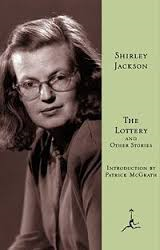 According to Writer’s Almanac, Shirley Jackson‘s controversial short story “The Lottery” was published in The New Yorker sixty-five years ago. When it first appeared, hundreds of readers wrote to the magazine, many of them wanting to cancel their subscriptions because they were so upset by the story. Jackson later wrote:
According to Writer’s Almanac, Shirley Jackson‘s controversial short story “The Lottery” was published in The New Yorker sixty-five years ago. When it first appeared, hundreds of readers wrote to the magazine, many of them wanting to cancel their subscriptions because they were so upset by the story. Jackson later wrote:
“On the morning of June 28, 1948, I walked down to the post office in our little Vermont town to pick up the mail. I was quite casual about it, as I recall — I opened the box, took out a couple of bills and a letter or two, talked to the postmaster for a few minutes, and left, never supposing that it was the last time for months that I was to pick up the mail without an active feeling of panic. By the next week, I had to change my mailbox to the largest one in the post office, and casual conversation with the postmaster was out of the question, because he wasn’t speaking to me.”
If you’re curious how a piece of writing could cause such a reaction, I’ve included the first page below:
From The Lottery, by Shirley Jackson:
The morning of June 27th was clear and sunny, with the fresh warmth of a full-summer day; the flowers were blossoming profusely and the grass was richly green. The people of the village began to gather in the square, between the post office and the bank, around ten o’clock; in some towns there were so many people that the lottery took two days and had to be started on June 20th, but in this village, where there were only about three hundred people, the whole lottery took less than two hours, so it could begin at ten o’clock in the morning and still be through in time to allow the villagers to get home for noon dinner.
The children assembled first, of course. School was recently over for the summer, and the feeling of liberty sat uneasily on most of them; they tended to gather together quietly for a while before they broke into boisterous play, and their talk was still of the classroom and the teacher, of books and reprimands. Bobby Martin had already stuffed his pockets full of stones, and the other boys soon followed his example, selecting the smoothest and roundest stones; Bobby and Harry Jones and Dickie Delacroix—the villagers pronounced this name “Dellacroy”—eventually made a great pile of stones in one corner of the square and guarded it against the raids of the other boys. The girls stood aside, talking among themselves, looking over their shoulders at the boys, and the very small children rolled in the dust or clung to the hands of their older brothers or sisters.
Soon the men began to gather, surveying their own children, speaking of planting and rain, tractors and taxes. They stood together, away from the pile of stones in the corner, and their jokes were quiet and they smiled rather than laughed. The women, wearing faded house dresses and sweaters, came shortly after their menfolk. They greeted one another and exchanged bits of gossip as they went to join their husbands. Soon the women, standing by their husbands, began to call to their children, and the children came reluctantly, having to be called four or five times. Bobby Martin ducked under his mother’s grasping hand and ran, laughing, back to the pile of stones. His father spoke up sharply, and Bobby came quickly and took his place between his father and his oldest brother.
The lottery was conducted—as were the square dances, the teen club, the Halloween program—by Mr. Summers, who had time and energy to devote to civic activities. He was a round-faced, jovial man and he ran the coal business, and people were sorry for him because he had no children and his wife was a scold. When he arrived in the square, carrying the black wooden box, there was a murmur of conversation among the villagers, and he waved and called. “Little late today, folks. ” The postmaster, Mr. Graves, followed him, carrying a three-legged stool, and the stool was put in the center of the square and Mr. Summers set the black box down on it. The villagers kept their distance, leaving a space between themselves and the stool, and when Mr. Summers said, “Some of you fellows want to give me a hand?” there was a hesitation before two men. Mr. Martin and his oldest son, Baxter, came forward to hold the box steady on the stool while Mr. Summers stirred up the papers inside it. (continued)
You can read the entire short story here. If anything, the public reaction to this story proves the power of fiction, especially when it is written well. Do you think fiction written today could cause such a stir? Have you ever fired off a letter to an author to voice a complaint or an appreciation?
—————–
UPDATE: The Secret Sense of Wildflower AUDIO version is now a vailable on:
Amazon.com Also available on iTunes.
LISTEN TO A FREE SAMPLE on Audible, Amazon or iTunes.




